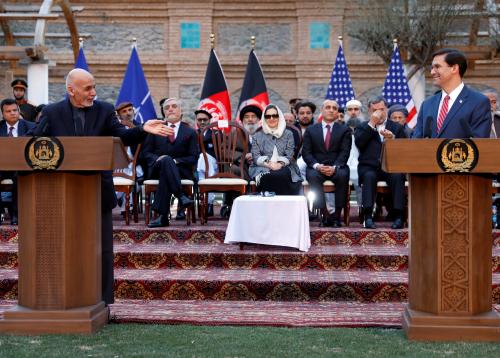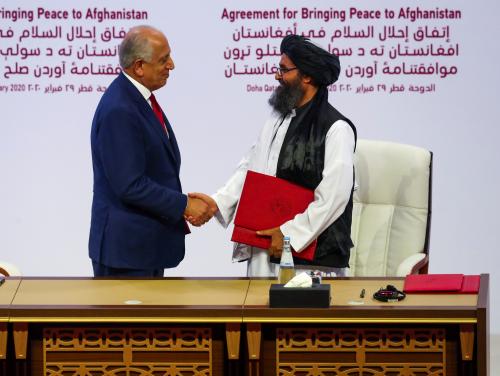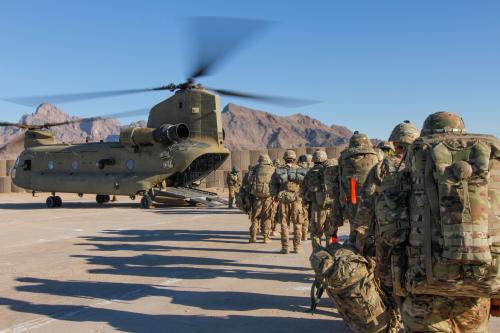At the start of the long war in Afghanistan, acts of torture and related war crimes were committed by the U.S. military and the CIA at the Bagram Internment Facility and in so-called “black sites” in eastern Europe. Such actions, even though they were not a standard U.S. practice and were stopped by an Executive Order from President Obama in 2009, nonetheless violate basic principles of international humanitarian law.
To date, only a few of the direct perpetrators of these abuses have been brought to justice through U.S. military court martials. Significantly, U.S. investigations have not worked their way up the chain of command to hold accountable more senior officials who may have ordered or authorized torture and the targeting of civilians in Afghanistan. That will now change as the International Criminal Court opens an investigation into war crimes in Afghanistan committed by both the Taliban and the U.S. military.
A turning point
On March 5, the Appeals Chamber of the International Criminal Court (ICC) issued a striking decision, reversing an earlier ruling of the Court’s lower Pre-Trial Chamber and authorizing an investigation into war crimes related to the war in Afghanistan, including those that may have been committed by U.S. citizens. An investigation will now commence that could well lead to the indictment of U.S. service members, intelligence officials, and their commanding authorities for their conduct in Afghanistan more than a decade ago.
Such an investigation — while good for human rights and ending impunity — is something the U.S. has long sought to avoid and was, in fact, avoidable. But, U.S. failure to fully investigate and prosecute these acts at home, along with the Trump administration’s vitriolic attacks on the court, now makes it more likely Americans will be prosecuted by the ICC.
Thursday’s ruling marks the first time the International Criminal Court, founded more than two decades ago, has set its sights on the U.S. Because the U.S. never ratified the Rome Statute establishing the court, it cannot investigate crimes by Americans that occur on U.S. soil. But under international law, where U.S. citizens commit crimes in countries that have ratified the Rome Statute, such as Afghanistan or Iraq, they may be prosecuted. The court’s jurisdiction over Americans in the Afghanistan case is based on the fact that those crimes occurred — in whole or in part — in Afghanistan, which ratified the Rome Statute back in February 2003.
The prosecution of American service members for acts in Afghanistan could have been easily avoided. Most obviously, the U.S. could have started the war in Afghanistan in compliance with humanitarian law — avoiding torture and the unnecessary killing of civilians. Afterall, early in the Obama administration policies changed to prohibit such conduct without materially limiting the U.S. military’s effectiveness in Afghanistan. But, even once those crimes occurred early in the war, international prosecution was not inevitable. As I have argued elsewhere, the ICC was established as a court of secondary jurisdiction, leaving national governments as the primary actors to hold their soldiers and commanding officers responsible for war crimes. The court can only step in where national governments fail to undertake investigations and prosecutions themselves. As part of the ICC proceedings, the trial court assessed whether the U.S. had done so and found that “no national investigations have been conducted against those who may be most responsible.” Had the U.S. — under Presidents Bush, Obama, or Trump — made justice for past mistakes in Afghanistan a priority, including by investigating and prosecuting senior officials who may have ordered the crimes that occurred in Afghanistan, the ICC would have been stopped in its tracks. Instead, the U.S. military justice system only prosecuted a handful of lower-level soldiers.
Governed by law, attuned to politics
Notwithstanding these failures to bring to justice those most responsible through investigations at home, the ICC’s new investigation could still have been avoided politically. Throughout the history of international criminal justice, the ICC and related tribunals such as the International Criminal Tribunal for the Former Yugoslavia (ICTY), have gone out of their way to avoid investigations of U.S. conduct. The ICC prosecutor declined to investigate U.S. and U.K. conduct in Iraq after the Iraq war. Similarly, the International Criminal Tribunal for the Former Yugoslavia declined to investigate potential crimes by NATO in the Balkans in the late 1990s and early 2000s. While in both of those cases the courts had sound legal grounds to exercise prosecutorial discretion and not investigate Americans, their motives may have also been, in part, political.
Even though the ICC is a legal institution, its officials must at times think and act politically and strategically. The law itself leaves the prosecutor significant discretion to decide, for example, which cases to bring and whom to prosecute. Political considerations, such as the court’s relations with key states, undoubtedly figure into those decisions, even if not publicly stated. The ICC depends on powerful states for funding, assistance with investigations, the arrest of suspects, and political support at the United Nations and elsewhere. International courts have, not surprisingly, been loath to bite the hand that feeds them. To date, they have not brought cases against citizens of the European countries that provide the bulk of their financial support or against the U.S., which has an unmatched capacity to assist the court with evidence collection (such as satellite imagery or related intelligence) and the political heft to block some of the ICC’s actions through the U.N.
Many proponents of international criminal justice lament the court’s dependence on rich, powerful states and criticize its prosecutors’ decisions to focus predominately on weak states in Africa. But, the ICC’s need for U.S. political support and investigative assistance has meant that the court has given the U.S. the benefit of the doubt whenever possible, offering an added layer of protection against investigations of U.S. conduct.
A fraught past
While the U.S. and the ICC have long had a troubled past, the court has sought to retain as productive a working relationship with the U.S. as possible. That goal was understandable, given the see-saw nature of U.S. engagement with the ICC. Back in 2000, President Clinton signed the Rome Statute establishing the Court. During President Bush’s first term, the U.S. made clear that it would not formally join the court and actively sought to undermine its work by pressuring other countries to sign agreements barring them from sending Americans to be prosecuted or face aid cutoffs.
But, during President Bush’s second term, the U.S. and the ICC saw a rapprochement when the U.S. allowed the U.N. Security Council to give the court authority to prosecute the perpetrators of the genocide in Darfur, Sudan. Under President Obama, relations warmed still further as the U.S. engaged more closely with the court and even offered assistance with evidence collection. In 2010, State Department Legal Advisor Harold Koh announced his intention to meet with the “prosecutor at the ICC to examine whether there are specific ways that the United States might be able to support the particular prosecutions that already underway in the Democratic Republic of Congo, [and] Sudan.” Some such evidence became part of the prosecutor’s investigatory files. While the U.S. never ratified the Rome Statute, the ICC knew it was better off with tacit support from and a good working relationship with the U.S. This is not to suggest that the Obama administration was trying to appease the ICC to avoid prosecution, but rather that the ICC, a politically savvy actor chooses its cases carefully and focused its attention elsewhere in part because it valued a good relationship with the U.S. and understood the Obama administration to be continuing the war in Afghanistan largely in compliance with international humanitarian law.
The ICC’s hopes for a productive working relationship with the U.S. quickly dimmed under the Trump administration. Speaking at the U.N. General Assembly, President Trump proclaimed: “As far as America is concerned, the ICC has no jurisdiction, no legitimacy, and no authority.” Similarly, Secretary of State Mike Pompeo has argued that the ICC is “attacking America’s rule of law,” noting “the threat it poses to American national sovereignty.” Even more starkly, John Bolton, the former national security advisor and long-time ICC critic, has said: “We will not cooperate with the ICC. We will provide no assistance to the ICC. We will not join the ICC. We will let the ICC die on its own. Afterall, for all intents and purposes, the ICC is already dead to us.” Not surprisingly, after such statements the court saw little reason to remain deferential to the U.S. or to seek its support.
What the U.S. now faces
When ICC Prosecutor Fatou Bensouda initially asked the court’s judges for permission to open the Afghanistan case in November 2017, the Trump administration’s response confirmed the sense that there was nothing left to lose. The Trump administration promptly revoked her U.S. visa and Secretary Pompeo said: “We are prepared to take additional steps, including economic sanctions, if the ICC doesn’t change its course.”
Perhaps the judges of the ICC’s Pre-Trial Chamber heard Secretary Pompeo’s threat or, more likely, hoped the relationship with the U.S. was still salvageable. That body’s initial decision in April 2019 blocked the court’s investigation in Afghanistan, invoking thin legal reasoning to find that such an investigation would not be in the “interests of justice.” The Pre-Trial Chamber observed that “changes within the relevant political landscape … make it extremely difficult to gauge the prospects of securing meaningful cooperation from the relevant authorities” and concluded that “the prospects for a successful investigation and prosecution [are] extremely limited.” Such a consideration was not relevant or appropriate under the governing law. The ICC faced much criticism for what was an almost explicit statement that it needed U.S. support and should not go after Americans for their conduct in Afghanistan.
The decision is legally sound and ethically right. But it represents a dangerous turn of international justice against the U.S.
Rather than accept a legal gift from the ICC, however, the Trump administration continued to bash the court and attack its prosecutor, who, not surprisingly, appealed the decision of the Pre-Trial Chamber blocking the investigation. In the shadow of escalating attacks from the U.S. government and growing pressure from civil society to stand up to the U.S., the Court’s Appeals Chamber reversed course on Thursday. It found that the Pre-Trial Chamber should not have undertaken a review of the “interests of justice” and that consideration of state cooperation were inappropriate at this phase of the proceedings. As a result, the Appeals Chamber green-lighted the prosecutor’s investigation in Afghanistan, including U.S. conduct at black sites in Europe. The decision is legally sound and ethically right. But it represents a dangerous turn of international justice against the U.S.
As the court launches its formal investigation in the weeks ahead, it is quite possible, perhaps even likely, that it will fail to attain now decade-old evidence of U.S. crimes. It will certainly get no help from President Trump in those efforts. So too, it remains unlikely that high level U.S. officials will ever fall into the hands of the ICC and face international justice.
But, there is a broader lesson to this story: It is often better to have a court on your side than against you. For decades, the institutions of international justice have sought to preserve their relationship with the U.S. and interpreted the law to avoid direct conflict whenever possible. The Pre-Trial Chamber’s decision in April was a last-ditch effort to do so. The Appeals Chamber decision this week marks a turning point. The Trump administration has now fully squandered that good will and the ICC will no longer seek U.S. support. Instead, faced with no other plausible alternative, the ICC may set its sights more actively on the U.S.









Commentary
The Trump administration misplayed the International Criminal Court and Americans may now face justice for crimes in Afghanistan
March 11, 2020